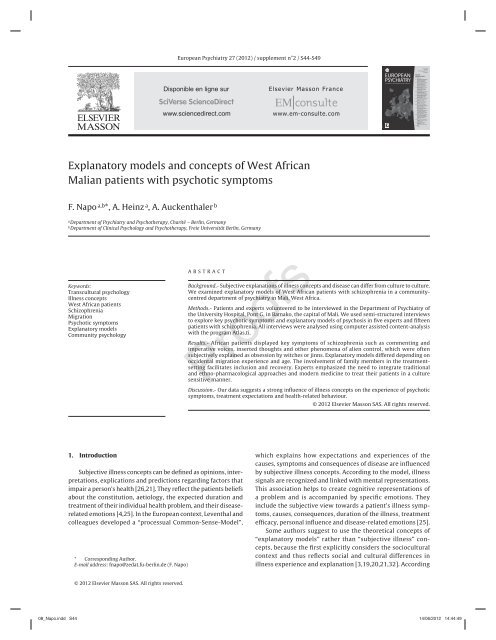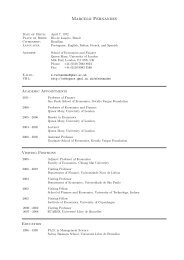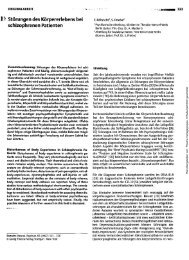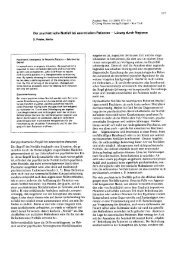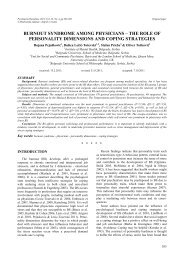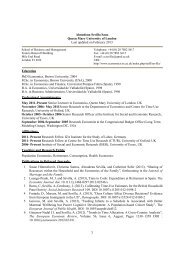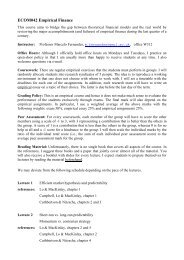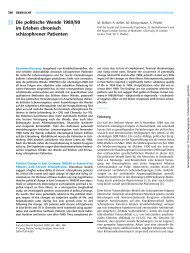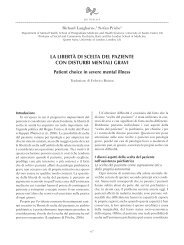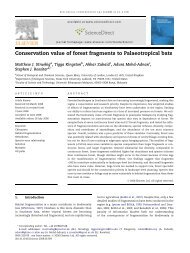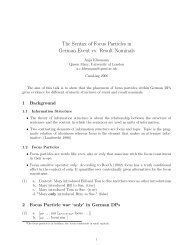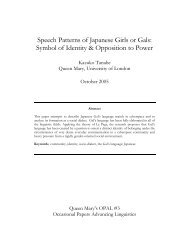Proofs - Personal Webspace for QMUL - Queen Mary, University of ...
Proofs - Personal Webspace for QMUL - Queen Mary, University of ...
Proofs - Personal Webspace for QMUL - Queen Mary, University of ...
Create successful ePaper yourself
Turn your PDF publications into a flip-book with our unique Google optimized e-Paper software.
© 2012 Elsevier Masson SAS. All rights reserved.<br />
European Psychiatry 27 (2012) / supplement n°2 / S44-S49<br />
Explanatory models and concepts <strong>of</strong> West African<br />
Malian patients with psychotic symptoms<br />
F. Napo a,b *, A. Heinz a , A. Auckenthaler b<br />
a Department <strong>of</strong> Psychiatry and Psychotherapy, Charité – Berlin, Germany<br />
b Department <strong>of</strong> Clinical Psychology and Psychotherapy, Freie Universität Berlin, Germany<br />
Keywords:<br />
Transcultural psychology<br />
Illness concepts<br />
West African patients<br />
Schizophrenia<br />
Migration<br />
Psychotic symptoms<br />
Explanatory models<br />
Community psychology<br />
1. Introduction<br />
ABSTRACT<br />
Subjective illness concepts can be defi ned as opinions, interpretations,<br />
explications and predictions regarding factors that<br />
impair a person’s health [26,21]. They refl ect the patients beliefs<br />
about the constitution, aetiology, the expected duration and<br />
treatment <strong>of</strong> their individual health problem, and their disease-<br />
related emotions [4,25]. In the European context, Leventhal and<br />
colleagues developed a “processual Common- Sense- Model”,<br />
* Corresponding Author.<br />
E-mail address: fnapo@zedat.fu- berlin.de (F. Napo)<br />
<strong>Pro<strong>of</strong>s</strong><br />
68767<br />
EUROPEAN<br />
PSYCHIATRY<br />
THE JOURNAL OF THE EUROPEAN PSYCHIATRIC ASSOCIATION<br />
ISSN 0924-9338<br />
June 2012<br />
Vol. 27 - Supplement n°2<br />
pp. S1-S81<br />
Migration<br />
and Mental Health<br />
S1 Editorial<br />
A. Heinz, U. Kluge<br />
S4 The willingness to participate in health research<br />
studies <strong>of</strong> individuals with Turkish migration<br />
backgrounds: barriers and resources.<br />
A qualitative analysis <strong>of</strong> focus groups<br />
D. Dingoyan, H. Schulz, M. Mösko<br />
S10 Socio-economic status and emotional distress<br />
<strong>of</strong> female Turkish immigrants and native<br />
German women living in Berlin<br />
MC. Aichberger, Z. Bromand, A. Heredia<br />
Montesinos, S. Temur-Erman, A. Mundt, A.<br />
Heinz, MA. Rapp, M. Schouler-Ocak<br />
S17 Mental health <strong>of</strong> Turkish woman in Germany:<br />
resilience and risk factors<br />
Z. Bromand, S. Temur-Erman, R. Yesil,<br />
A. Heredia Montesinos, MC. Aichberger,<br />
D. Kleiber, M. Schouler-Ocak, A. Heinz,<br />
MC. Kastrup, MA. Rapp<br />
S22 The infl uence <strong>of</strong> stigma on depression, overall<br />
psychological distress, and somatization<br />
among female Turkish migrants<br />
A. Heredia Montesinos, MA. Rapp, S. Temur-<br />
Erman, A. Heinz, U. Hegerl, M. Schouler-Ocak<br />
S27 Translation and adaptation <strong>of</strong> the Zung<br />
Self-Rating Depression Scale <strong>for</strong> application<br />
in the bilingual Azerbaijani population<br />
F. Mammadova, M. Sultanov, A. Hajiyeva,<br />
M. Aichberger, A. Heinz<br />
S32 Construction and interpretation <strong>of</strong> self-related<br />
function and dysfunction in Intercultural<br />
Psychiatry<br />
A. Heinz, F. Bermpohl, M. Frank<br />
S44 Explanatory models and concepts <strong>of</strong> West<br />
African Malian patients with psychotic<br />
Symptoms<br />
F. Napo, A. Heinz, A. Auckenthaler<br />
S50 How to express mental health problems:<br />
turkish immigrants in Berlin compared to native<br />
Germans in Berlin and Turks in Istanbul<br />
A. Vardar, U. Kluge, S. Penka<br />
S56 Health services and the treatment <strong>of</strong><br />
immigrants: data on service use, interpreting<br />
services and immigrant staff members<br />
in services across Europe<br />
U. Kluge, M. Bogic, W. Devillé, T. Greacen,<br />
M. Dauvrin, S. Dias, A. Gaddini, NK. Jensen,<br />
E. Ioannidi-Kapolou, R. Mertaniemi,<br />
R. Puipcinós i Riera, S. Sandhu, A. Sarvary,<br />
JFF. Soares, M. Stankunas, C. Straßmayr,<br />
M. Welbel, A. Heinz, S. Priebe<br />
S63 The German concept <strong>of</strong> “intercultural opening”<br />
as an answer to challenges <strong>of</strong> migration<br />
- the development <strong>of</strong> an assessment tool<br />
<strong>for</strong> the appraisal <strong>of</strong> its current implementation<br />
in the mental health care system<br />
S. Penka, U. Kluge, A. Vardar, T. Borde,<br />
D. Ingleby<br />
S 70 Cross-cultural training in mental health care<br />
– challenges and experiences from Sweden<br />
and Germany<br />
S. Bäärnhielm, M. Mösko<br />
S75 Teaching psychiatry and establishing<br />
psychosocial services – lessons<br />
from Afghanistan<br />
I. Missmahl, U. Kluge, Z. Bromand, A. Heinz<br />
S80 Afterword<br />
A. Kleinman<br />
Background.- Subjective explanations <strong>of</strong> illness concepts and disease can differ from culture to culture.<br />
We examined explanatory models <strong>of</strong> West African patients with schizophrenia in a communitycentred<br />
department <strong>of</strong> psychiatry in Mali, West Africa.<br />
Methods.- Patients and experts volunteered to be interviewed in the Department <strong>of</strong> Psychiatry <strong>of</strong><br />
the <strong>University</strong> Hospital, Pont G, in Bamako, the capital <strong>of</strong> Mali. We used semi- structured interviews<br />
to explore key psychotic symptoms and explanatory models <strong>of</strong> psychosis in fi ve experts and fi fteen<br />
patients with schizophrenia. All interviews were analysed using computer assisted content- analysis<br />
with the program Atlas.ti.<br />
Results.- African patients displayed key symptoms <strong>of</strong> schizophrenia such as commenting and<br />
imperative voices, inserted thoughts and other phenomena <strong>of</strong> alien control, which were <strong>of</strong>ten<br />
subjectively explained as obsession by witches or jinns. Explanatory models differed depending on<br />
occidental migration experience and age. The involvement <strong>of</strong> family members in the treatmentsetting<br />
facilitates inclusion and recovery. Experts emphasized the need to integrate traditional<br />
and ethno- pharmacological approaches and modern medicine to treat their patients in a culture<br />
sensitive manner.<br />
Discussion.- Our data suggests a strong infl uence <strong>of</strong> illness concepts on the experience <strong>of</strong> psychotic<br />
symptoms, treatment expectations and health- related behaviour.<br />
© 2012 Elsevier Masson SAS. All rights reserved.<br />
which explains how expectations and experiences <strong>of</strong> the<br />
causes, symptoms and consequences <strong>of</strong> disease are infl uenced<br />
by subjective illness concepts. According to the model, illness<br />
signals are recognized and linked with mental representations.<br />
This association helps to create cognitive representations <strong>of</strong><br />
a problem and is accompanied by specifi c emotions. They<br />
include the subjective view towards a patient’s illness symptoms,<br />
causes, consequences, duration <strong>of</strong> the illness, treatment<br />
effi cacy, personal infl uence and disease- related emotions [25].<br />
Some authors suggest to use the theoretical concepts <strong>of</strong><br />
“explanatory models” rather than “subjective illness” concepts,<br />
because the fi rst explicitly considers the sociocultural<br />
context and thus refl ects social and cultural differences in<br />
illness experience and explanation [3,19,20,21,32]. According<br />
08_Napo.indd S44 14/06/2012 14:44:49


